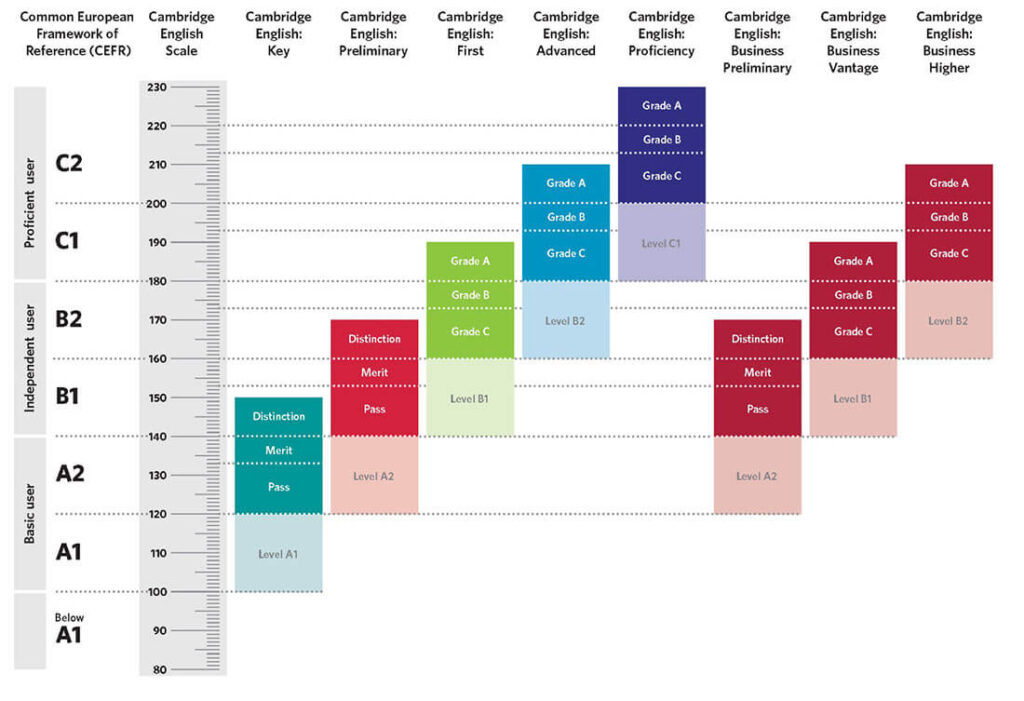Twenty years ago, a certificate in English was deemed necessary to study or work outside the Netherlands. Nowadays many companies in the Netherlands use English as the lingua franca and most universities offer Bachelor’s or Master’s programmes (partially) in English.
To prepare young people for studies or work in the Netherlands, or elsewhere, many secondary schools are now offering TTO (TweeTalig Onderwijs) or at the very least offering their students the opportunity to take Cambridge English exam courses. Teachers wishing to teach their subject in English at a TTO school are required to have at least a C1 level of English. Many of these teachers sit the Cambridge Advanced (C1) or Proficiency (C2) exam.
Recognition
Cambridge English qualifications are recognised by more than 25,000 schools, universities and employers all over the world. A Cambridge English certificate is proof of the CEFR level you have achieved in Reading, Use of English, Writing, Listening and Speaking.
You can sit the Cambridge exams at many locations in the country.
Cambridge English certificates (KET, PET, FCE, CAE & CPE) are valid for life!
CEFR explained
The Common European Framework of Reference for Languages, commonly known as the CEFR, is a guideline put together by the Council of Europe to describe the achievements of learners of foreign languages. The CEFR makes it easier for educational institutions and employers to evaluate language qualifications of potential students or employees. Its aim is to provide a method of learning, teaching and assessing that applies to all European languages. The six reference levels (A1, A2, B1, B2, C1, C2) are widely accepted as the European standard of an individual’s proficiency in a given language.

| PROFICIENT USER | C2 | Can understand with ease virtually everything heard or read. Can summarise information from different spoken and written sources, reconstructing arguments and accounts in a coherent presentation. Can express him/herself spontaneously, very fluently and precisely, differentiating finer shades of meaning even in more complex situations. |
|---|---|---|
| C1 | Can understand a wide range of demanding, longer texts, and recognise implicit meaning. Can express him/herself fluently and spontaneously without much obvious searching for expressions. Can use language flexibly and effectively for social, academic and professional purposes. Can produce clear, well-structured, detailed text on complex subjects, showing controlled use of organisational patterns, connectors and cohesive devices. | |
| INDEPENDENT USER | B2 | Can understand the main ideas of complex text on both concrete and abstract topics, including technical discussions in his/her field of specialisation. Can interact with a degree of fluency and spontaneity that makes regular interaction with native speakers quite possible without strain for either party. Can produce clear, detailed text on a wide range of subjects and explain a viewpoint on a topical issue giving the advantages and disadvantages of various options. |
| B1 | Can understand the main points of clear standard input on familiar matters regularly encountered in work, school, leisure, etc. Can deal with most situations likely to arise whilst travelling in an area where the language is spoken. Can produce simple connected text on topics which are familiar or of personal interest. Can describe experiences and events, dreams, hopes & ambitions and briefly give reasons and explanations for opinions and plans. | |
| BASIC USER | A2 | Can understand sentences and frequently used expressions related to areas of most immediate relevance (e.g. very basic personal and family information, shopping, local geography, employment). Can communicate in simple and routine tasks requiring a simple and direct exchange of information on familiar and routine matters. Can describe in simple terms aspects of his/her background, immediate environment and matters in areas of immediate need. |
| A1 | Can understand and use familiar everyday expressions and very basic phrases aimed at the satisfaction of needs of a concrete type. Can introduce him/herself and others and can ask and answer questions about personal details such as where he/she lives, people he/she knows and things he/she has. Can interact in a simple way provided the other person talks slowly and clearly and is prepared to help. |


























